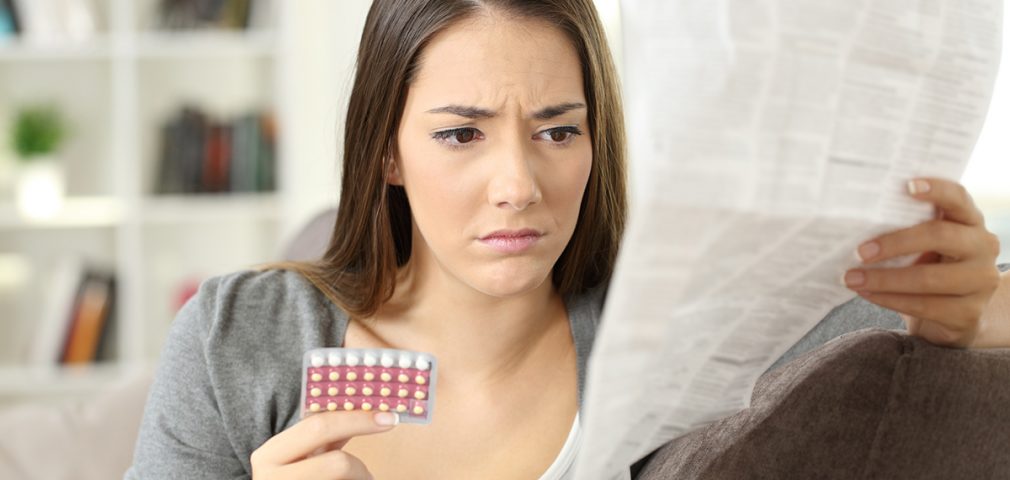
PCOS and the Pill go together like peanut butter and jelly right? I was handed the pill at 16 even before anyone explained why I was feeling so crappy, why my cycle was so funky, why I was breaking out, why I gained weight so easily and what PCOS even was.
I never tolerated the pill well, but I know that’s not the case for every woman. Some women feel fine, even better on the pill than they did without it. But is the pill the right answer for PCOS?
With the pill there’s pros and cons, let’s start with positive:
Upsides of the Pill:
- Very effective for preventing pregnancy. Easy to take and usually free or covered by insurance.
- Often temporarily resolves troublesome PCOS symptoms like acne.
- Will typically give you a predictable bleed – although this is not a true period and please, please don’t believe the malarkey that the pill “balances your hormones” or “normalizes your period”. More on that in a sec.
- Bleeding on the pill is usually light and manageable.
- It’s once a day vs. trying to manage what you eat, getting to the gym, managing stress and several supplements. Let’s be real, popping one little pill is easier! At least perhaps in the short term.
- The pill also can be treatment for severe hormonal issues and was an important step in women’s right to have legal access to contraception. Amen to that!
Before we get to the downsides, let’s talk about what the pill is.
The pill shuts down your normal production of estrogen and progesterone by basically short circuiting ovulation. I talked about progesterone’s amazing properties and the necessity of ovulation in this post.
We need our own estrogen and progesterone for healthy and happy brains, bones, muscle mass and libido. These hormones are the results of healthy ovulation so remember that having a baby is far from the only outcome of ovulation!
The pill contains synthetic, hormone-like steroids such as ethinylestradiol, levonorgestrel, and drospirenone. These drugs do not have the exact same effects your own hormones do.
Here are a few key differences that are important to PCOS:
Our own estrogen and progesterone are great for us having healthy hair, but synthetic progesterone (levonorgestrel) contributes to hair loss and women with PCOS often suffer hair loss already.
Women with PCOS are already at increased risk for heart disease and drospirenone (Yasmin) increases heart disease risk as well as the risk for fatal blood clots by 700 percent.
Our own estrogen improves insulin sensitivity and women with PCOS typically have more insulin resistance. Both ethinylestradiol and levonorgestrel can worsen insulin resistance.
More PCOS Related Downsides:
Although it’s presented that way, the pill is not the only option for PCOS, nor is it even the best option for PCOS in my experience. Not by a long shot.
- It does not fix any underlying hormone problems – and makes several of them like thyroid and low progesterone worse.
- The Pill drives up inflammation which is already present in PCOS and inflammation disrupts every hormone in your body. I call inflammation the great hormone mess-maker because of this.
- The bleed on the pill is not a “normal” period despite what it’s marketed as. Rather it’s a withdrawal bleed but not an indication of a normal cycle or normal hormone balance.
- It creates some significant nutrient deficiencies such as zinc, B6, CoQ10, selenium and magnesium. Low levels of these will negatively impact mood, thyroid health and nearly every single cell in your body.
- Oxidative stress in particular is not often discussed when we talk about downsides to the pill but that can profoundly impact overall health, speed up aging, worsen autoimmunity and increase inflammation. Women with PCOS in general deal with greater oxidative stress burdens and like inflammation, the pill just makes it worse.
The pill creates a drastic elevation in sex hormone binding globulin that sometimes lasts for many, many years after stopping the pill. This results in lower free, active sex hormones like estrogen and testosterone which can lead to weight gain, low libido, depression and eventually some of the symptoms you went on the pill to counter like acne and hair loss.
And it will lower available free thyroid hormone (by increasing thyroid binding globulin) too and this can lead to depression, hair loss, brain fog and weight gain. Again, many things those of us with PCOS already are struggling with.
Finally, it will profoundly disrupt the gut. We have a special subset of gut bacteria that metabolize estrogen and the pill really harms these little buggers. An unhealthy gut can cause annoying things like bloating but it will also lead to more significant hormone disruptions, worsening thyroid health, increased health risks and of course, inflammation, and we have too much inflammation with PCOS already.
While all of the above downsides are true, they won’t affect all of us with PCOS to the same degree.
For example, if your thyroid is stellar a slight drop in free T3 maybe won’t make a huge difference for you and how you feel. However if you’re like most women with PCOS your thyroid isn’t stellar and you may feel that dip in active, free thyroid hormone more significantly. You’ll see depression (a VERY common side effect of the pill), fatigue and weight gain more easily.
Or if you already tend towards some gut troubles or wittingly or unwittingly are eating foods that cause you inflammation, the pill will likely make you feel more bloated and drive your inflammation up quicker.
But please also know that there is no shame in the pill. If the pill feels like the right solution for you at least right now, there is absolutely no judgement on that! This isn’t about right or wrong, this is about you knowing a couple of things:
#1 You have other options!
That’s the most important point I want to drive home. When women tell their docs they don’t want to take the pill it’s assumed these women are going to do nothing for their PCOS.
Working with diet, exercise, and supplements isn’t doing nothing! It’s just doing something else. In my opinion, it’s doing something better because we are actually working with your hormones instead of shutting the whole thing down.
#2 If you’re on the pill there are a few things you should supplement with to lessen the impact.
You can learn exactly how to support your hormones with these key nutrients in this FREE protocol.
#3 Know that whatever hormonal issues that were there before the pill will be waiting patiently for you when you come off the pill.
This matters because the biochemical and hormonal underpinnings of PCOS are not resolved by the pill and often made worse, so if you are inclined to heal your PCOS being on the pill only prolongs the work we need to do. Give yourself 6-12 months to recover from the pill particularly if you are planning to get pregnant.
#4 I want to reiterate that point above: there is no shame in the pill or fertility treatments or Metformin or any of it. You are the boss of you 🙂
But now that you know what you’re up against with the pill, you can make a more informed choice about whether or not this is the right option for you right now.
And know that can change! Maybe it’s right or wrong now but in three years what feels right for you may be totally different.
OK what about preventing pregnancy?
That deserves its own post but know that there are other options and some common fertility tracking tools don’t fully take PCOS into account.
I’ll be covering all of this in the upcoming Empowered PCOS program so be sure you join me for the FREE Inflammation and Women’s Hormones webinar September 16, 8PM EST.
